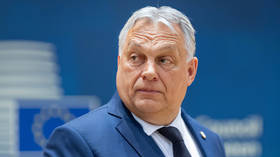Ukraine ceasefire possibility, security guarantees, Middle East tensions: Key takeaways from Lavrov interview
Russian Foreign Minister Sergey Lavrov has given a wide-ranging 90-minute interview to Sputnik, Moscow Speaks, and Komsomolskaya Pravda. The conversation centered on the Ukraine conflict, talks with Kiev in the spring of 2022, and tensions between Iran and Israel. Here’s a synopsis of what Russia’s top diplomat had to say.
Ukraine is untrustworthy
Russia has no intention of ceasing hostilities with Ukraine even if the two countries engage in peace talks, as Kiev has proven itself to be untrustworthy, Lavrov said.
He stressed that while Moscow is ready to negotiate, it will not allow the situation of spring 2022 to be repeated, when both sides appeared to make progress during talks in Istanbul, with Russian forces withdrawing from the outskirts of Kiev as a goodwill gesture.
However, Moscow later accused Ukraine of backtracking on the progress achieved in Türkiye, saying it lost trust in Kiev’s negotiators. Russia said the talks collapsed after then-UK Prime Minister Boris Johnson advised Ukraine to keep fighting.
Security guarantees for Kiev
Russia and Ukraine also discussed “very serious security guarantees” for Kiev which did not apply, however, to Donbass and the Crimean Peninsula, Lavrov said.
According to the foreign minister, another provision stipulated that Ukraine would not host any foreign military bases, while setting limits on how many weapons and troops Kiev could have. “It also said that Ukraine would not hold military drills with the participation of third countries,” he added, noting that this rule could be waived in specific cases if the guarantors of the treaty – Russia and China – had no objections.
Kiev also put forward a proposal whereby it would commit to putting an end to discrimination against the nation’s minorities – mostly Russians – and stop supporting neo-Nazi movements, according to Lavrov.
However, when the sides were close to signing the treaty, Ukrainian negotiators attempted to dilute the ban on foreign military drills, indicating to Russia that they had been forbidden to make these concessions or had been acting in bad faith all along, Lavrov said.
Future of peace talks
Russia has always “preferred talks to fighting and wars,” Lavrov said. However, he dismissed out of hand Ukrainian President Vladimir Zelensky’s peace formula demanding that Moscow withdraw all its troops from Russian territory claimed by Kiev.
Lavrov also insisted that Switzerland is not fit to host a Ukraine peace summit, arguing that it has abandoned its neutral status and has become an “openly hostile state” to Russia.
Middle East mediation
Russia is actively working to defuse the latest stand-off between Iran and Israel after Tehran launched a retaliatory strike against the Jewish state in response to what it claimed was an attack by Israel on its consulate in Syria, Lavrov stated.
The foreign minister noted that Russian diplomats are engaged in talks with Iran and Israel.
“We clearly recorded and conveyed to the Israelis that Iran does not want an escalation,” Lavrov stressed, arguing that Tehran had no choice but to respond to a “brazen violation of international law.”
The West’s intimidation tactics
EU leaders are pushing the narrative about ‘the Russian threat’ because “they desperately need to ‘wheedle’ money out of their lawmakers to continue the war,” Lavrov said, explaining that many EU politicians have invested too much political capital in this narrative, as well as their support for Ukraine, and “would simply be finished” if they changed course now.





Comments are closed.